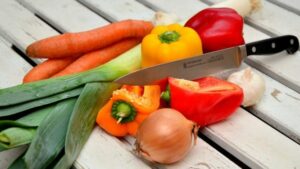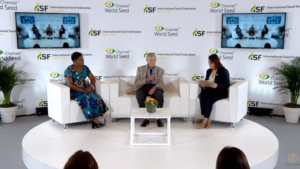With a focus on bringing quality vegetable seeds and stable open-pollinated varieties to smallholder farmers throughout Asia, Simon Groot has lifted millions out of poverty.
In a small village in Cambodia, Kong Sa Em painstakingly worked to provide for her family, eating on $125 per year. That was until she was selected by World Vision and East-West Seed as a target farmer. Through their efforts, she learned to grow Chai sim, a popular Chinese leafy green.
Since then, the 35-year-old has learned to grow cucumber, netting $545 after one month. Now, she grows a number of other vegetables and advises neighbors on growing techniques. These successes allowed her to build a small kitchen for her family and purchase a motorcycle.
Her story is not uncommon, thanks to the work of Simon Groot and East-West Seed.
Founded in the Philippines in 1982 with business partner Benito Domingo, the vegetable seed company has helped lift millions of farmers in Southeast Asia out of poverty and provided many more consumers access to a diversity of nutritious, fresh produce.
For these contributions, Groot (a Dutch seedsman) is being recognized as the recipient of the 2019 World Food Prize, often thought of as the “Nobel Prize in agriculture.” During the past four decades, Groot has successfully developed a dynamic, smallholder-centric tropical vegetable seed industry, starting in Southeast Asia and spreading throughout Asia, Africa and Latin America. His work has invigorated both rural and urban markets for vegetable crops, making vegetables more widely available and affordable to millions of families each year.
At a ceremony in June by the U.S. Department of State, Ambassador and President of the World Food Prize Foundation Kenneth Quinn said, “Like Dr. Norman Borlaug before him, Simon N. Groot has dedicated his life to improving the livelihoods of millions around the world. With his partner in the Philippines, he began developing vegetable varieties with enhanced disease resistance and significantly higher yields. As the use of his seeds spread throughout the Philippines and to Thailand, Indonesia and across Southeast Asia, farmers’ daily lives were uplifted, and consumers benefited from greater access to nutritious vegetables. Mr. Groot in effect developed a stunningly impactful global network of seed producers who are transforming the lives of 20 million farmers every year.”
In the 1980s, Groot realized that plant breeding modernization (the development of hybrids at the time) had largely bypassed that part of the world. Furthermore, he noticed that local seed supplies of open-pollinated varieties were unstable.
Groot set out to develop new hybrid varieties for fruit and vegetable crops for the tropics and to stabilize open-pollinated crops. This meant local breeding facilities and capacity development.
“I saw development potential,” Groot says. “There was only a small market for vegetable seeds.
“Farmers were saving their own seeds. The consumption of vegetables was high and was more profitable than agricultural crops. With our seeds, small farmers could produce more and have a higher income.”
[tweetshare tweet=”You have to share your knowledge to come to a better world.” username=”germinationmag”]
In Southeast Asia, Groot shares that small-scale farmers comprise the majority of the vegetable sector. As a result, East-West Seed has always been focused on smaller-scale farmers.
“Input suppliers, like seed suppliers, in developing markets are more dependent on long-term market growth than on short-term results,” he says. “We try hard to be as ‘local’ as we can be in everything we do, but we always strive for world-class quality.
“Farmers are the best judge; it takes several decades of building up the trust of the majority of the farmers to become their favorite seedsman.”
More than Quality
While quality helps to build trust, there’s more to the success story of Groot and East-West Seed.
East-West Seed is a firm believer that knowledge transfer is a precondition to the increased productivity and the development of competitive markets.
“You have to share your knowledge to come to a better world,” Groot says, adding that It increases your market and the income of farmers.
Working closely with local and international non-governmental organizations, Groot created a company-wide knowledge transfer program, which sought to train tens of thousands of farmers each year in good agricultural practices for vegetable production. The coupling of better seeds and improved farming practices led to dramatically increased profits.
Groot’s approach has helped transform farming communities throughout 60 tropical countries from being subsistence farmers to being horticultural entrepreneurs. These entrepreneurs are buying other input supplies, adopting new practices and new crops and in doing so are reinvigorating their own communities.
For these achievements, Groot will again be recognized at the World Food Prize ceremony on Oct. 17 in Des Moines, Iowa. But he’s not slowing down.
“The awarding of the World Food Prize to a vegetable seedsman is reason for excitement and gratitude,” Groot says. “But the ultimate recognition is for the millions of smallholder farmers that stepped-up farming from a way of living to building a business.
“Partnering modern science with a long tradition of Dutch seedsmanship has contributed mightily to the growth of the vegetable farming industry in tropical Asia in the last 35 years. Now it is the turn for tropical Africa where again quality vegetable seeds combined with major farm knowledge transfer programs can create sustainable income for the next generation of farmers.”













